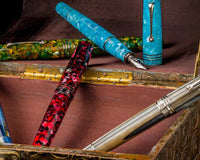Part of the fun of being a fountain pen lover is discovering something new about your hobby even after some years of experience. At one point, pen lovers will eventually find out about bent fountain pen nibs. Though bent nibs are usually associated with damaged pens, this special nib type is actually fashioned in this specific style for a reason.
Here, we’ll talk about what a bent fountain pen nib is and how you can use it.
What is a bent nib?
Bent nibs are also called “fude” (pronounced foo-deh) nibs. “Fude” means ‘bent’ in Japanese. These are specialized nibs bent at the tip to give it a curved or rounded surface area. This extra surface area allows fountain pen users to write with more varied line widths depending on the angle of the pen on paper.
About the fude nib
The Japanese art of calligraphy makes use of what is called a fudepen (筆ペン), more commonly known as a brush pen. This cartridge-based writing instrument works much like a fountain pen in its essence.
In the same way that a brush pen is used for East Asian calligraphy, a fude nib is also traditionally used for writing Kanji or Hanzi characters. These fude nibs are special because they produce line variations like no other nibs do. When held upright, the pen produces a thinner line. The closer the nib is to the paper, the thicker and bolder the lines become. Aside from changing the angle of the pen, line weight can be controlled as well by putting more or less pressure on the nib.
This allows those who are doing calligraphy to write out complex characters with precision and control. The lines of these characters change in width as a person writes, making the fude nibs the right type of fountain pen for the job.
What makes fude nibs special?
Fude nibs are special because they produce line variations like no other nibs do. When held upright, the pen produces a thinner line. The closer the nib is to the paper, the thicker and bolder the lines become. Aside from changing the angle of the pen, line weight can be controlled as well by putting more or less pressure on the nib.
Benefits of Using a Bent Fountain Pen Nib
Fude nibs may take time to get used to, but there are many benefits to using them.
Perfect for ink lovers
Bent nibs are typically more generous with ink flow, so they can help you show off any fancy inks you own, such as shading, sheening, and shimmering inks.
Line control
It is easier to create uniform lines with bent-nib pens. However, you can also create line variation depending on how you angle your pen or add pressure when you write. Writers have more control over this using fude nibs than other types of nibs.
Excellent for drawing and sketching
Because fude nibs are able to produce a variety of line widths, they are great for drawing and sketching. There would no longer be a need to bring various pens or pencils of different nibs with you since you have a bent nib!
Clean and elegant appearance
Ink generosity combined with clean lines makes fude nib fountain pens an excellent choice on any writing or drawing work centered on sleekness and elegance. The precision of a bent nib is difficult to mimic with other, more fluid pen tips.
If you do decide to try this type of nib, you can start with something like the Sailor 1911 Calligraphy Fude de Mannen fountain pen.

Difficulties of using bent nibs
Bent nibs have many benefits. However, they can also be a drawback for fountain pen users for several reasons.
Differs from other fountain pens
If you are already familiar with using standard fountain pen nibs, then the design of the bent nib may not be for you. The learning curve may be greater, and writing with the bent nib can take some time to get used to.
Performs poorly with extended writing
Fude nibs are designed for calligraphy, so they may not be the best choice for long writing sessions. Writing with this type of bent nib requires more attention and dedication, which can be exhausting after extended periods of writing.
Not ideal for lefties
If you are a left-handed writer, then it may be a bit more difficult to work with a fude nib. Unless your hand is positioned over your writing, the wetness of a fude nib may cause smudging and smearing as you write.
The Bottom Line

Bent nibs are a special type of nib, and they may not be for everyone. But that’s the fun part of this hobby — discovering new things! Whether you decide to choose Sailor or other brands for your first fude nib, you’ll definitely have an interesting time learning how to write with this very unique nib.
By Some Folks at EndlessPens







